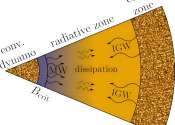Novel calculations peg age of 'baby' asteroid
An asteroid dubbed "Lucy's baby" after a NASA spacecraft discovered it is orbiting another asteroid last November is,, in fact,, a solar system toddler—just 2–3 million years old, a Cornell-led research team estimates ...









